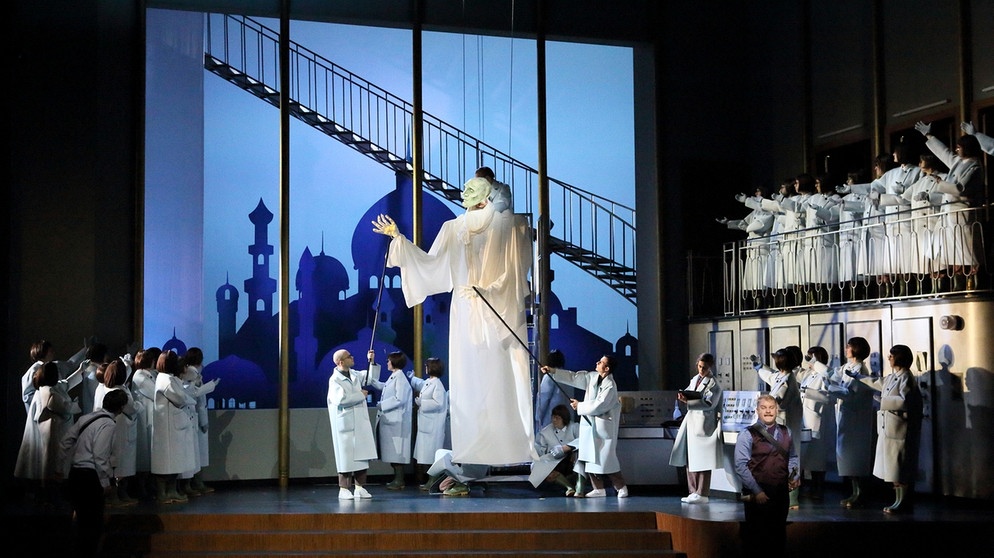 |
| From an early production of Der Freischütz 1822 |
Magic Bullets Carl Maria von Weber Der Freischütz, Laurence Equilbey conducting the Insula Orchestra and Choeur Accentus, and soloists at the Barbican, London. Weber's Der Freischütz Op. 77, J. 277 is a seminally important work, a milestone in music history, and represents a turning point, too, in wider European cultural history. Without Weber and Der Freischütz, music, not just opera, might
not be as we know it today. No Der Freischütz, no Wagner, no Berlioz, no Schumann, no Mahler. Moreover it's a key document of the Romantic era and its revolutionary impact on culture, the arts, society and so much more. Misunderstand Der Freischütz and misunderstand the 19th and 20th centuries ! A few years back some smalltown critic declared that if he didn't know it, ("it only has one tune!") it can't have been important. That says more about those who think that getting a press pass makes them somebody. If they need to bring a friend to help, they shouldn't be doing the job. One of the messages in Der Freischütz is that there's no such thing as a magic bullet.
In German speaking countries Der Freischütz is pretty much basic repertoire, and elsewhere in Europe, it's extremely well known. The classic recording was conducted by Carlos Kleiber, no less, and it was a favourite of Colin Davis who conducted it at his very last performance at the Barbican. What's significant about this latest Barbican performance is that Equilbey, Insula and Accentus are specialist par excellence in French repertoire and aesthetics. Though Der Freischütz does benefit from an understanding of the German context, there's no reason why it can't be approached from a different perspective. Plenty of forests in France, plenty of hunting societies, plenty of upheavals in society. Hector Berlioz was so inspired that he did an adaptation in French with a text he wrote himself. It's very good - John Eliot Gardiner conducted it in London not all that long ago, and the Orchestra of the Age of Enlightenment marked their 30th anniversary with the German Der Freischütz and Mark Elder. Indeed, a lighter, brighter period-informed style can connect better to Weber and his aesthetic than a more interventionist approach.
Der Freischütz was first performed in 1821, just seven years after Napoleon's defeat. Many in the audiences in early performances would have had direct personal experience of the wars and their impact on German-speaking lands, and a background knowledge of the Thirty Years War and its impact. Romanticism has nothing to do with being "romantic" in the modern sense of the word Its ideals galvanized European thought, especially in Germany which hitherto had been a diverse conglomeration of 300 states. This period saw the growth of solidarity between German-language speakers, whatever their region. Nationalism then was a progressive, unifying force. This interest in the past wasn't about the past but a way of using the past to validate new ideas like national identity and the role of the individual. Thus the interest in German folklore, in Brentano and von Arnim's Des Knaben Wunderhorn, in the poetry of Gottfried Herder and even the concept "Gedanken sind Frei" (Read more here) the individual as opposed to mass authority. From the Romantik sprang the revolutions of 1848, all over Europe, not just Germany. Understanding this context is fundamental to appreciating Der Freischütz.
Der Freischütz portrays an idealized vision of the German past, where hunters provide sustenance and live (more or less) in harmony with Nature. But remember that forests can be dangerous places. Not for nothing are they a symbol of the unknown, and of the unconscious. Read Simon Schama: Landscape and Memory (2004), Jeffrey Wilson The German Forest (2012). And, for that matter Bruno Bettelheim's The Uses of Enchantment. Disney sanitized our appreciation of fairy tales as folk psychology, and infantilized meaning. Absolutely resist the idea that Der Freischütz should either be sentimental or kitsch. The people in this opera inhabit a world where danger and loss is never very far away. Max, a humblejunior huntsman, wants to marry Agathe, the boss's daughter, but in this rigid, hierarchical society he has no chance of challenging the social order. To win Agathe, he has to do a deal with the Devil, whom Samiel represents. If Max escapes in the end, it's only because Caspar pays the price and Prince Ottokar intervenes as deus ex machina. It's a near thing. Agathe could have been killed and Max executed for murder.
Weber's music is exquisitely beautiful, as if it were, like the magic bullet, deflecting truth from those who can't handle reality. Magic Bullets are not a solution. Indeed, this opera can even allude to the dangers of quick-fix nationalism and instant expertise. Utterly relevant in modern times. When we listen to Weber's hunting horns and rousing choruses, we should think about what's being hunted, and why. The music is ravishingly beautiful because it emphasizes the beauty of life, refreshed by the connections to Nature that hunting for food depends on. But killing is a bloody business, it's not pretty and it's not sentimental
Because I was suddenly taken ill the night before, my partner went alone (too late to give away the spare). Veteran of many Freischützs, he appreciated Equilbey's approach, and had a wonderful time. "Superbly done. Great orchestra and singers and a subtle, simple semi-staging ,including a brilliant dancer/acrobat as an omnipresent Samiel, writhing about like a lizard or creeping like a wolf. And all the dialogue - no nonsense of messing about with it.". Fortunately, Equilbey, Insula and Accentius have been touring Europe with Der Freischütz and will be releasing a new recording in the near future. A must, I think.



_of_'Le_Freisch%C3%BCtz'_at_the_Th%C3%A9%C3%A2tre_Lyrique_1866_-_Gallica.jpg)

